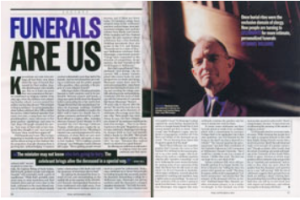The DipFC is achieved by completing Module 1, Module 2, and Module 4.
The transition from ape to man – homo sapiens – is defined by the ceremonial burying of the dead. Funeral ceremonies have been with us since rational man could first walk upright.
The writer considers it personally alarming how many people and celebrants consider they can just walk into a scene and “do a funeral”. My personal experience is, unless you really know how to create a funeral ceremony, you can do great and lasting psychological harm to those attending. The bitter memory of a clumsy, mediocre or ill-prepared funeral ceremony remains with a person for years. It is difficult to conceive of a greater tragedy in this life than the death of someone you love, so to assist with a funeral is a very serious responsibility. The majority of experienced celebrants consider funerals to be the most important work they do.

Article in TIME magazine of September 6, 2004. It featured the opinions and ideals of the College Principal, Dally Messenger (see photo also). The Full Text can be found at – http://www.collegeofcelebrancy.com.au
Training and Education are necessary for a Funeral Celebrant
The key event which assists people in deep grief, is a sensitively processed, conscientiously prepared and checked, compassionately delivered personal funeral ceremony.
None of this can be done well without thorough and proper education and training. One of the problems which plagues civil celebrancy is – many consider skills are not needed to create and prepare a funeral — with predictably disastrous results. Reports of disastrous funerals, which only exacerbate grief, are almost a daily occurrence for professional celebrants.
Work in the Field – with experienced Funeral Celebrants
As well as theoretical learning in regard to the process of grief, the college requires students to attend funeral ceremonies. They are then required to give a detailed report on their observations and learnings, regardless of whether it has been for good or ill. We place our students with funeral celebrants of excellent reputation so the student can learn, in the field, how to prepare and deliver a funeral ceremony to the best of their ability.
We have videos of funerals for students in remote locations or where attending in person is difficult. We do, however, prefer students to attend actual ceremonies.
Funeral Celebrancy
All good education and training is the distilled experience of people who are successful in the field, and who have made important discoveries, which come to be essential to the craft. A good funeral celebrant should be thoroughly conversant with the nature of grief. They should have an awareness of the cultural and religious streams which makes up their society and community, and consequently, be totally convinced of the importance of focused listening skills.
They must be knowledgeable in the resources of music, poetry, prose, symbolism, and choreography which are appropriate for the funeral ceremony. They should be convinced of the psychological need for meaningful ceremonies of substance, both for secular and religious people.
Appreciation – a danger
Regrettably, many civil celebrants get carried away with the appreciation they get from even minimal personalism in a ceremony, without any awareness they could do so much better. The College believes in, practises and teaches “best practice” principles.
Principles of Funeral Co-creation
 Central to the work of the civil funeral celebrant, is the appropriate creation of the eulogy or biography. Grieving people need to know the tribute is proper, and follows a certain genealogical and chronological fullness. It must be honest without giving offence and, above all, must be fully and completely checked with the client family. It is obvious, to do funeral celebrancy well, one must have a certain skill and training in creative writing, the ability to speak in public with feeling, without inappropriate drama, and should have the sources and resources to create a ceremony which will be, for many years, a source of consolation for the bereaved.
Central to the work of the civil funeral celebrant, is the appropriate creation of the eulogy or biography. Grieving people need to know the tribute is proper, and follows a certain genealogical and chronological fullness. It must be honest without giving offence and, above all, must be fully and completely checked with the client family. It is obvious, to do funeral celebrancy well, one must have a certain skill and training in creative writing, the ability to speak in public with feeling, without inappropriate drama, and should have the sources and resources to create a ceremony which will be, for many years, a source of consolation for the bereaved.
The College’s current Diploma in Funeral Celebrancy teaches there is no such thing as a short cut to good funeral. We are given one chance, and one chance only, to “get” the funeral ceremony right. It is immoral to train by experimenting on the job — a process the College condemns as “victim-based learning”.
A fully personally created ceremony is no easy task, and should not be taken on lightly. The College considers its students and members should adopt the principle of continuous self-assessment, peer assessment, and learning. This is done through their studies, which have a sound component of “field work”, observing and reporting on celebrant and religious funerals of all kinds, as well as practising ceremony preparation to an acceptable level before taking on the responsibility of such an important task.
Begin your Diploma studies today !

